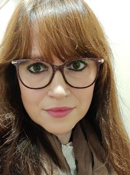Andra Dumitru obtained her bachelor degree in Chemical Engineering from the Polytechnic University of Bucharest, followed by a master of Organic Chemistry from Complutense University of Madrid in 2012. Upon completing her master studies, Andra changes gears from the chemistry field and starts a Ph.D. in Physics under the supervision of Prof. Ricardo Garcia at the Instituto de Ciencia de Materiales de Madrid (CSIC) with a JAE PreDoc fellowship. During her PhD she develops atomic force microscopy methods for biomedical applications and focuses on the mechanical characterization of soft matter at the nanoscale. As a chemist, she is drawn towards multidisciplinary approaches, so she expands her knowledge in biophysics and surface chemistry within the atomic force microscopy field.
After her PhD, Andra joins the nano-biophysics group of Prof. David Alsteens at the Catholic University of Louvain, in Belgium, funded by several Belgian postdoctoral fellowships like MoveIN Louvain co-funded by Marie Curie Actions and FNRS-Charge de Recherche. As a postdoc, Andra focuses on combining high-resolution atomic force microscopy and live cell confocal imaging to study mechanical and biophysical properties of single molecules and cells.
She moves back to Spain in 2021 funded by a Juan de la Cierva Incorporacion fellowship and joins the Molecular mechanics of the cardiovascular system group led by Dr. Jorge Alegre at the Centro Nacional de Investigaciones Cardiovasculares in Madrid. While working with Dr. Jorge Alegre, she is awarded several competitive and prestigious postdoctoral fellowships, like Atraccion Talento CAM, Marie Curie Individual Fellowship, a tenure-track Ramon y Cajal grant.
Andra is currently pursuing her goal of becoming an independent researcher funded by a Junior Leader Incoming grant by the La Caixa Foundation. She is currently developing her own research line centered on studying the mechanical regulation of nuclear proteins in pathogenic conditions. Her aim is to address biomedical problems relevant for the society, such as diabetes mellitus, cancer or ageing with a cross-disciplinary approach that combines state-of-the-art nano-biophysics with single-molecule techniques, protein biochemistry and animal models.
